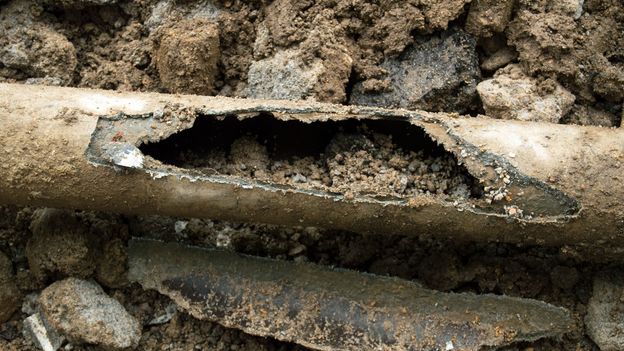Hundreds of thousands of miles of pipes made from asbestos cement deliver drinking water to people around the world, but are reaching the end of their lifespan and starting to degrade. Scientists are now debating whether this could pose a risk to human health.
“The water pipe burst on the top of the hill and flooded into the gas network,” remembers Alan Walker, owner of the Village Stores in Stannington, a suburb of Sheffield on the edge of the Peak District in England. “By the morning, people were turning on their gas hobs and water was coming out. It was one of the worst winters we had. We were one of the last houses to be reconnected, 13 days later.”
He is recalling an incident from December 2022. The burst water main affected more than 3,000 homes, and around 10,000 people in Stannington. More than a year on, it should be just a bad memory of a cold and unpleasant winter. But the water burst highlighted another nagging concern.



This seems like a really odd article, they gloss over the fact that asbestos causes lung problems as it stays in the lung and basically cuts it to pieces. I don’t believe it is the chemical composition of asbestos that causes the issues (not 100% on that) but the damage it does.
It’s a bit like saying knife crime causes lots of injuries and deaths and we’ve now realised people have knives at home so maybe they’ll start suffering similar issues. I know that’s an over simplification and not a perfect comparison, but you get the point.
The article also mentions multiple times that there is no clear evidence of issues caused via ingestion. I agree though that more research should be done but articles like this will unnecessarily worry people that aren’t aware there are lots of AC pipes and how asbestos causes illnesses.
Most water pipes these days are plastic, are micro plastics likely to be better or worse in the long run?
Whilst I might sound like someone that works for big asbestos I’m not! I do work in the water industry though so possibly this influences my opinion slightly as I was already aware of the amount of AC pipes.
Also have worked in the water industry, and the knife comparison is apt. I was confused by the article, AC is an issue for the crews cutting out chunks but they use water to ensure the particles don’t get air borne. It’s about breathing it in and not about
The burst water pipe part did it for me especially. AC is starting to deteriorate but when pipes are pressurized like that a break doesn’t mean particulates are going into the water system.
Problem is, we don’t know for sure that the same thing doesn’t happen in the intestines
It causes lung problems because they are sharp fibers that get stuck in the tiny air sacs and build up.
It wouldn’t be unreasonable to question if they may also get stuck in the lining of people’s esophagus or stomach lining, kidneys, bladders, urethra, etc.
Perhaps it could cause stomach ulcers, rectal issues or kidney stones.
Also most underground city mains are not made from plastic, they are made from metals. And yes they can also cause many issues, such as lead poisoning in flint Michigan.
How can you say this and not come to the conclusion that swallowing these particles is some how not bad?
Just think about it for a moment.
Probably by knowing that after lots of studies there are no signs that it’s bad. And that if drinking water gets in your lungs, you have more urgent problems than asbestos.
I’m not saying I’m certain it isn’t bad, but there article itself points out that none of the studies done have shown any evidence yet.
Also, I think it’s a similar comparison to snake venom, deadly when injected but usually harmless when ingested.